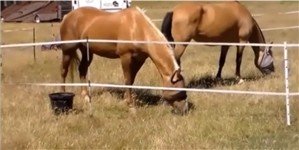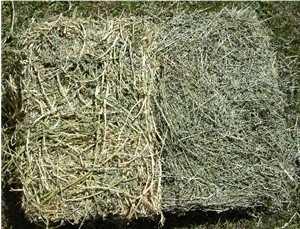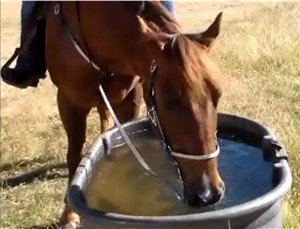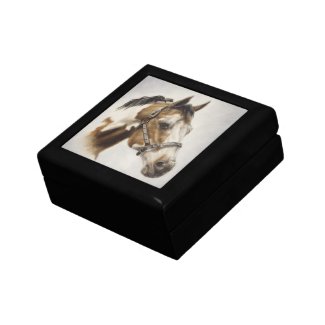Horse Salt Block and Other Minerals
Is Your Horse's Diet Balanced?
Minerals and a horse salt block are an essential part of a healthy equine diet. Fortunately most of the needed minerals are found in hay, grains and mineralized salt.... If fed in the right proportions. Trouble comes when horses get too much or too little of any given mineral in their diet. It's all about balance...
Minerals for Horses
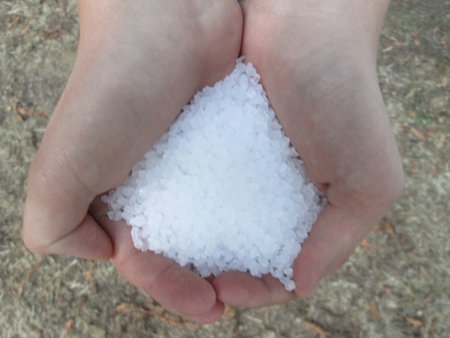 Loose rock salt
Loose rock saltDid you know calcium, phosphorus and salt have the highest potential to cause serious damage when they are out of balance?
Salt for Horses – The Big Kahuna
Salt (sodium chloride) is so important that it must be fed free choice to all horses. An adult horse that is not being used will eat about ½ pound of salt a week! The harder the horse is being used the more salt the horse will need. If free choice salt is made available, most horses will be able to get the salt they need, but not always.
Sometimes a Free Choice Horse Salt Block is Not Enough
If a horse is working very hard with excessive sweating, especially in a hot climate, the horse may not be able to lick enough salt off that horse salt block to meet their needs. Horses suffering from a salt deficiency will tire easily and have muscle spasms. They will also stop sweating, causing the body to overheat and go into shock. Lactating mares low in salt will drop in milk production.
If you suspect your horse may not be getting enough salt you can add ¼ - ½ cup loose rock salt to their grain rations. Or better yet, offer loose rock salt and a salt block free choice. It is nearly unheard for a horse to receive too much salt as long as they have access to fresh water.
Salt Block vs. Loose Salt
So called 'horse salt blocks' are actually designed for cows to lick with their rough tongues. Loose rock salt is easier for horses to eat.
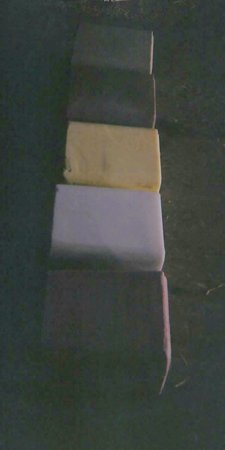 5 different kinds of salt blocks
5 different kinds of salt blocksSalt is so important for hard working horses, that I add loose rock salt to the grain rations when we go packing with horses. I also add salt regularly to our little 28 year old mare’s grain mix, even though she has a free choice horse salt block for two reasons. She has always been a sweaty little horse, more so than any of our others, so I know she is loosing a lot of salt. And she tends not to drink as much water. Adding the salt encourages her water intake and replaces what she has lost in sweat.
Adding loose rock salt to your horses grain rations during the cold winter months is also a neat little trick to encourage water intake. Sometimes horses in cold weather will avoid drinking cold water, because it’s cold! They get dehydrated and more prone to impaction colic when they’re not drinking enough water. Adding salt to the grain should never replace a free choice horse salt block, but only used to add additional salt to a horses diet when you think it is justified.
Horse salt blocks can be plain, iodized or mineralized. Be sure to give your horses the mineralized block. The iodized and mineralized salt blocks tend to look the same kind of reddish color, so read the label to get the right one.
Big players
Calcium and
Phosphorus make up about 70% of the minerals in a horses body!
Most all of it
contained in bones and teeth.
Calcium and Phosphorus
Think of calcium and phosphorus as partners. It is essential that these two minerals for horses be kept in balance. They work best when given in a 2:1 ratio of Calcium to Phosphorus.
Calcium and Phosphorus are the Two Minerals for Horses that are most likely to be out of balance!
Calcium deficiency’s happen when a young growing horse or a lactating mare are being fed on poor pasture or poor grass hay. This is bad news for a developing horses bones and joints. A young horse can develop lameness, enlarged joints, splints and epiphysitis. In adult horses calcium deficiency causes porous fragile bones.
Excessive calcium in the diet will inhibit the absorption of trace minerals.
Horses are unable to absorb the calcium when they have too much phosphorus in their diet. Horses can also get a phosphorus overdose when they are fed too much bran; either wheat bran or rice bran. It can cause a skull and jaw deformity called ‘big head’ or ‘bran disease’, along with other symptoms of calcium deficiency.
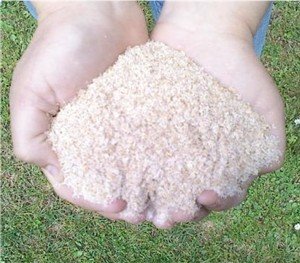 Wheat bran
Wheat branBran is a good feed additive to add to grain rations to help remove sand from the gut, but should never be feed as more than 10-15% of the total grain ration!
Phosphorus deficiencies occur when horses are fed on poor quality grass hay and pastures without grain rations. Low phosphorus causes a softening of the bones.
Selenium
Selenium is found in hay and grains and native plants. Some areas of the United States are known to be selenium deficient, thereby generating low selenium crops. And some areas are just the opposite, with high amounts of selenium in the soil, producing high selenium crops and plants that can be toxic to horses.
Selenium deficiencies cause a depressed immune system and muscle damage. It can cause “white muscle disease” and death in foals.
Selenium toxicity can cause a host of problems. Broken hoofs, main and tail hair loss “bob-tail disease”, anemia, brittle hair coat, lameness, blindness, aimless wondering, listlessness, weight loss, respiratory failure and death.
Here in North Western California we live in a low selenium area. All the hay and grain that is produced in Northern California, Oregon, Washington State and surrounding areas are low in selenium. At our veterinarian’s recommendation, we feed a mineral mix supplement containing selenium minerals for horses.
We recently acquired a new horse. I was not surprised when the previous owner told me that blood tests showed that he was low on selenium and that he needed the mineral mix added to his diet. I wish that everyone knew about the need for selenium in our area.
Find out about selenium in your part of the country and where your hay is coming from. If you live in a high selenium area you’ll need to find out what types of native plants your horses should avoid. Your vet is a great resource for information about minerals for horses in your area.

What Happens when Minerals for Horses are Out of Balance
Minerals for Horses
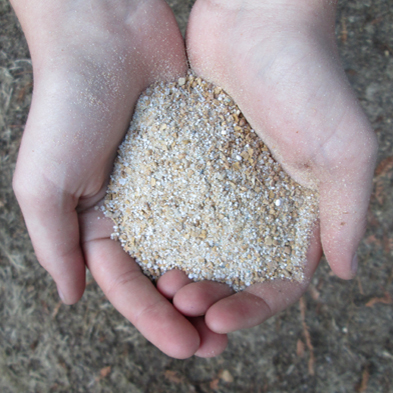 Horse Mineral Mix
Horse Mineral MixWe add this mineral mix to our horse's feed specifically for the selenium, because we live in a low selenium area.
Iodine: Iodine toxicity causes chronic respiratory disease and goiters. Feeding too much vitamin and mineral supplements can cause iodine overdose.
Potassium: Potassium deficiencies occur with excessive sweating or diarrhea. The horse will have muscle weakness and trembling. This can cause an overworked overheated exhausted horse to go into shock.
Zinc: Too much zinc causes bone problems and disturbs the calcium phosphorus ratio.
Iron: Iron deficiency usually only occurs with blood loss from parasites, lice or a traumatic injury.
Copper: Copper deficiency can causes anemia, still birth and chronic diarrhea.
Cobalt : Deficiency is rare.
Magnesium: Horses are not known to have deficiencies in magnesium.
Calcium: Low calcium causes bone disorders, high calcium inhibits absorption of other minerals.
Phosphorus: Low phosphorus causes soft bones, too much causes a calcium deficiency.
Selenium: Low selenium causes immune problems, too much is poisonous to horses.
Salt: Too little can cause shock and death, horses almost can't get too much salt.
Using a Horse Salt Block and Feed to Keep Minerals for Horses in Balance
To ensure your horses are getting the right mix of calcium and phosphorus, feed them high quality hay for horses and adequate amounts of grain. It is important that the bulk of a horses diet be fed as roughage and a much smaller portion as grain. Horses fed low amounts of roughage/hay and high grain portions can get too much calcium. Horses getting no grain can get low in phosphorus.
Also keep in mind, that it is very easy to overdose young horses on grain and feed supplements, causing permanent bone damage. Consult your vet about feed choices for pregnant mares and babies.
Trace minerals magnesium, sulfur and potassium are found in quality hay. Hay can loose its nutritional value over time. Feed only quality hay. Most of the remaining trace minerals can be had in sufficient supply with a free choice mineralized horse salt block.
Return to top of Horse Salt Block page to easily access the navigation bar on the left for more at Equine Spot.
